Event Summary: CAN-BIND Family and Friends Day – Brain Health and Wellness in Depression
On March 20, 2019, CAN-BIND hosted its fourth annual Family and Friends Day at the WE Global Learning Centre (WEGLC), Toronto – WE’s global hub for community engagement, service learning and youth programs. Inspired by Brain Awareness Week (March 11–17, 2019) this year’s event theme highlighted different aspects of brain health and discussed changes that can lead to improvements in depression care and treatment.
With over 100 attendees, the appreciation event featured hands-on wellness workshops, information booths hosted by partner-organizations, researcher presentations, lived-experience talks and a raffle draw for CAN-BIND’s study participants, their loved ones and the wider community. Read the event summary and download speaker presentations below.
Wellness Workshops
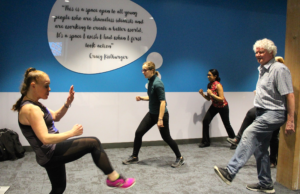
Two pre-event wellness workshops were held. Alisa Gayle, a group exercise instructor and professional pianist, engaged attendees in an energy boosting 30-minute beginner martial arts session. The workshop focused on basic martial arts exercises and tailored techniques that can be replicated at home. An example 30-minute online workout tutorial can be found here.
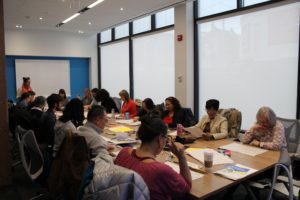
Ximena Moreno, an Expressive-arts Therapist and member of the Ontario Expressive Arts Therapy Association (OEATA) facilitated a 45-minute workshop that focused on various exercises combining inner-reflection and mindfulness and group drawing.
A city specific list of public and private Art Therapy services can be found here.
Information Booths
Various local and national collaborators and supporting organizations came together to host 10 information booths (see list below). The booths provided an opportunity for event attendees to learn about ongoing community mental health initiatives and find resources specific to their needs and interests. For more information about the organizations that participated in CAN-BIND Family and Friends Day 2019, click here.
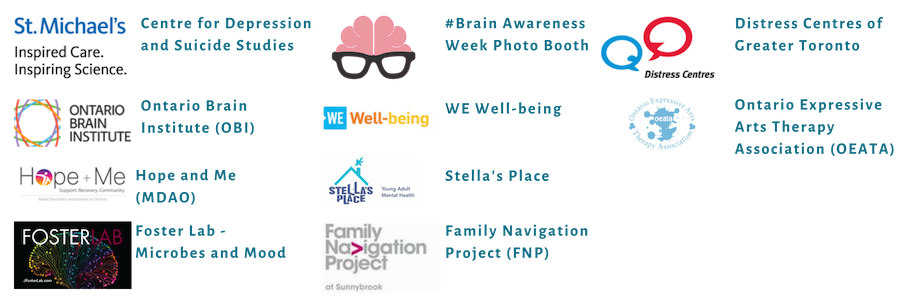
Speaker Presentations and Talks
Seven research experts and two lived-experience speakers gave presentations highlighting their research and personal experiences of living with depression and participating in research as study participants.
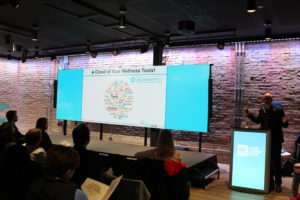
Staff Psychiatrist and CAN-BIND-1 Study Lead, Dr. Shane McInerney, emceed the event and kicked off the evening by sharing a word cloud consisting of words submitted by attendees that answered the question, “How do you keep your brain healthy?”
Drs. Susan Rotzinger, CAN-BIND Research Manager and Kirk Nylen, Vice President of Integrated Discovery and Analytics at the Ontario Brain Institute (OBI), warmly welcomed attendees on behalf of CAN-BIND and OBI.
Dr. McInerney provided an overview of the 16 CAN-BIND research studies, focusing on updates from the CAN-BIND-1 Antidepressant Medication, Wellness, and Long-term Follow up studies. All three studies have completed study participant enrolment. Multiple CAN-BIND platforms are now working together to cross-analyze the different types of data collected, including clinical, neuroimaging, molecular and electroencephalography (EEG). A recently published report on the clinical outcomes from the CAN-BIND-1 Antidepressant Medication study can be read here.
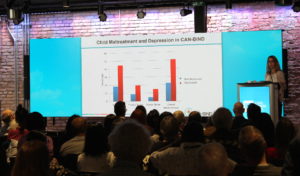
Keynote speaker Dr. Kate Harkness, Professor and Director of the Mood Research Laboratory at Queen’s University and Study Lead of the CAN-BIND-4 Stress and Reward Anhedonia (SARA) Study presented on the topic of how trauma changes the brain.
Dr. Harkness’s research focuses on adult depression related to stress and early childhood trauma. For more information on Childhood Maltreatment in Depression, read our Researcher Spotlight here.
Speakers Ms. Kathryn Sutcliffe and Mr. John Stewart shared their personal experiences of living with depression, highlighting hope and willpower as keys to recovery. Although their personal experiences are unique, both speakers shared how they work to maintain their wellbeing and provided insight into their experiences of participating in research.
No matter how sick you’ve been, there is always hope.
After 19 years of living with treatment-resistant depression, undergoing deep brain stimulation (DBS) helped Ms. Sutcliffe, a University Administrator, Mental Health Advocate and CAN-BIND Community Advisory Committee (CAC) Member, see the world in colour again. Ms. Sutcliffe concluded her powerful story by sharing, “No matter how sick you’ve been, there is always hope.”

Mr. John Stewart, a Commissioned Canadian Army Reserve Officer took a hearty approach to sharing his viewpoint on participating in depression research. Mr. Stewart encouraged individuals who participate in research to use study visits and results from questionnaires and observations as an opportunity to learn more about personal health and habits. “It’s their method, but your data. Learn from the findings” he shared. Mr. Stewart ended his talk by highlighting the importance of cognitive exercise, healthy eating and protecting the brain from physical injury and chemical influences to help maintain a healthy brain.

Dr. Claudio Soares, Professor and Head of the Department of Psychiatry at Queen’s University School of Medicine, Executive Committee member and Research Lead for CAN-BIND’s Mobile Health Technology and Innovation platform provided a thought-provoking talk exploring the question: Will mobile health technology soon play a role in treating depression or preventing relapse? “We can expect mobile health (M-health) to help us collect community and clinical health data, enhance measurement-based care and help generate real-time data through behavioural measurements and digital phenotyping” shared Dr. Soares.
Read more about how smartphones are redefining the management of depression here.
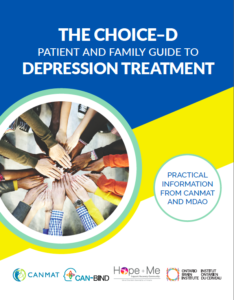
Janice Pong, CAN-BIND’s Communications & Knowledge Translation Manager and Andrew Kcomt, Co-lead of CAN-BIND’s CAC and Knowledge Translation & Research Manager at Hope + Me, Mood Disorders Association of Ontario provided an overview on the CHOICE-D Patient and Family Guide to Depression Treatment. The guide has been created to help individuals gain knowledge of available treatment options and to empower patients to communicate with healthcare providers and take a more active role in their personal care. View and download the free guide and evaluation form.

Dr. Francesco Leri, Professor of Psychology & Neuroscience at the University of Guelph and Research Co-lead for CAN-BIND’s Reverse Translation Platform presented on the topic of brain reward threshold in addiction disorders and depression. “Rates of mood disorders among drug abusers and rates of drug abuse among individuals suffering from mood disorders are substantially higher than expected from the individual rates of these disorders” shared Dr. Leri.
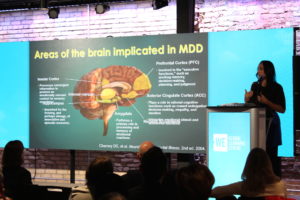
The final presentation of the evening was given by Dr. Sakina Rizvi, Scientist at the Arthur Sommer Rotenberg Suicide and Depression Studies Program, Assistant Professor of Psychiatry at the University of Toronto and Study Lead for the CAN-BIND-5 Suicide Risk Study.
Dr. Rizvi highlighted brain areas that are involved in suicide risk and are shown to be misregulated in depression. Two such areas are the prefrontal cortex (partly involved in cognitive control) and the amygdala (involved in emotional regulation). Antidepressant medication such as escitalopram and long-term psychotherapy treatment have shown to improve the functioning of both areas. Dr. Rizvi also provided a compelling overview of the positive biological (structural and functional) changes that depression treatment can have on the brain.
All research presentations have been uploaded and can be found below:
- Dr. Shane McInerney- Overview of the CAN-BIND-1 Studies
- Dr. Kate Harkness- How Does Trauma Change the Brain
- Dr. Claudio Soares- Will M-health Technology Soon Play a Role in Treating Depression or Preventing Relapse?
- Andrew Kcomt and Janice Pong- The CHOICE-D Patient and Family Guide to Depression Treatment
- Dr. Francesco Leri- Addiction and Depression
- Dr. Sakina Rizvi- The Changing Brain-From Depression to Recovery
Raffle Draw and More
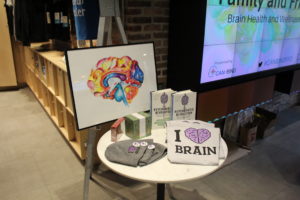
The event was concluded with our popular raffle draw. Prizes this year included a framed print of a watercolour painting by Lauren Squires, two copies of “The Psychobiotic Revolution: Mood, Food, and the New Science of the Gut-Brain Connection” by Scott C. Anderson, John F. Cryan, Ted Dinan donated by the Foster Lab, a friendship themed mug with tea and OBI giveaways.
Thanks to generous event funding from OBI, we were able to host this year’s CAN-BIND Family and Friends Day and offer travel reimbursements for Ontario-based CAN-BIND study participants and their family and friends living outside of Toronto. We would also like to thank the WE Global Learning Centre staff for their logistical support and venue subsidy.
Lastly, we sincerely thank all speakers, workshop and booth presenters, event volunteers, registrants and attendees for your time, support and interest. We look forward to welcoming everyone to our 5th annual Family and Friends Day next year!
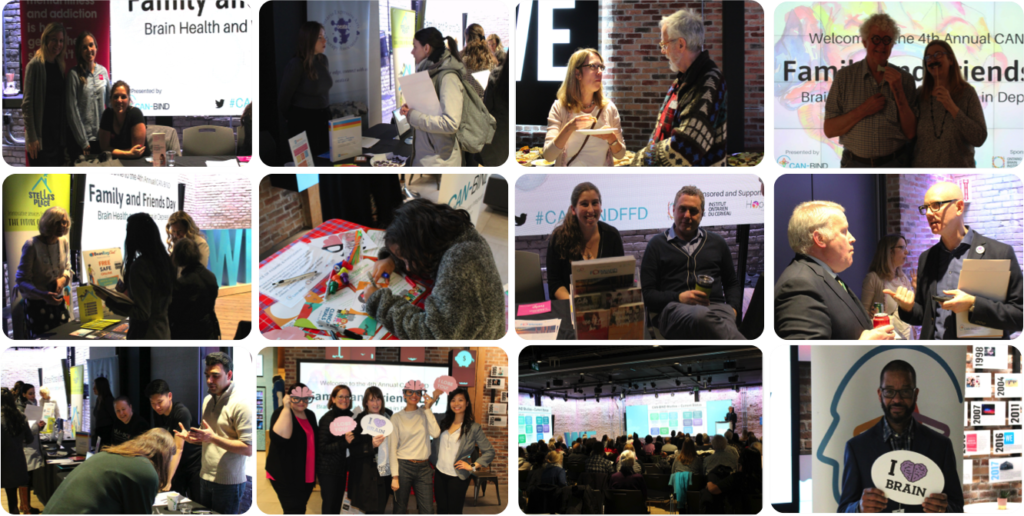
CAN-BIND Family and Friends Day is a free, annual outreach event. Stay tuned to read about upcoming public events and online resources by signing up to our newsletter here.
Photos by: Anum Shivji Arwani and Shane McInerney
Written by: Anum Shivji Arwani
Edited by: Janice Pong